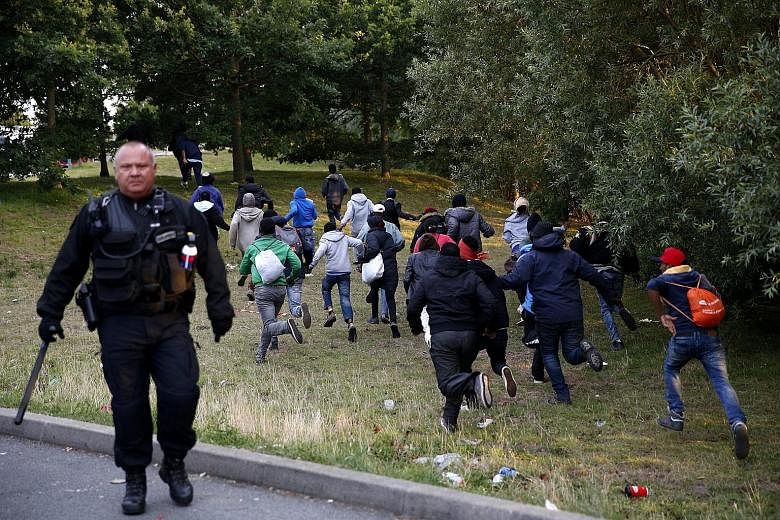CALAIS (France) • The sun had barely set when a 23-year-old Eritrean woman who gave her name as Akbrat fell into step with dozens of other men and women, and started scaling the fence surrounding the entrance to the French side of the Channel Tunnel.
The barbed wire cut her hands but she did not feel the pain. The police seemed to be everywhere. She thought of her five-year-old son back in Africa and ran zigzag through the falling shadows, once almost colliding with an officer in a helmet. Then she was alone. She slipped under the freight train and waited, clambering out just as it began moving.
But before she could hurl herself onto the train bed transporting trucks filled with Britain-bound produce, a French officer caught up with her, she recalled in an interview on Thursday. Blinded by tear gas, she stumbled and bruised her right ankle. After being ejected from the complex around the tunnel, it took her five hours to limp the 14.5km back to the refugee camp of makeshift shelters that its 3,000 inhabitants call "the jungle".
"You are lucky you were not killed," someone told her. "I am not lucky," she responded. "I will be lucky when I am in England."
The desperate scene playing out each night and day in Calais, with migrants trying to vault fences or cut their way through them and climb onto trains or into trucks going across the Channel to Britain, is just one chapter in a painful drama playing out across Europe.
For many of the migrants who have been coming to the continent from Africa, the Middle East and beyond, Calais, a mere 34km from the white cliffs of Dover, is their last stop.
If they make it across to Britain, many believe they will have reached safety and a better life. Some are attracted to Britain because they speak some English, others because they see better job prospects there than on the continent. A few even cite a strong pound.
Ten migrants have died trying to cross the Channel Tunnel to Britain over the past six weeks, said
Ms Chloe Lorieux, a nursing student who volunteers for the charity Medecins du Monde and helps at a clinic in the camp.
Last month, she said, a woman lost her baby after her waters broke prematurely when she tried to climb onto a train. Many here have multiple scars from barbed wire or police batons and, in the worst cases, multiple broken bones from being hit by a departing train.
"We see terrible injuries every day," Ms Lorieux said. But every night, a few make it.
How many, no one can say; estimates range from a handful to 40 people. That is what keeps them going, said Mima, 26, a university graduate from Ethiopia, who began his journey in June last year, fleeing a jail sentence as a member of an opposition party.
Calais, which has long been a gateway to Britain and was once under English rule, has become a snapshot of what is going on in the rest of the world. When there are troubles in Afghanistan, as there are now with the Taleban's return to several areas, the number of Afghans in the sprawling refugee camp in the Calais dunes rises.
Syrian refugees are there in large numbers and there are some Iraqis. Sudanese have come, as well as Somalis. Just a couple of years ago, there were more people from Burundi and Rwanda, said aid workers.
Set on the edge of the city of Calais in a dusty patch of land with no trees for shade, the refugee camp resembles camps throughout the underdeveloped world, or worse.
It has just 30 toilets for 3,000 migrants; international humanitarian standards would dictate one for every group of 20, Ms Lorieux said. For a long time, there was no water but now, spigots have been set up.
Since it is not an official refugee camp, there are none of the tents or sets of pots and pans or blankets that are usually provided to refugees by the United Nations or other aid groups. The shelters are patched together from wood, canvas and plastic bags donated by volunteers from Calais.
Some camp dwellers have tried hard to make "the jungle" more livable. Some of the black plastic sheets marking out most tents have been adorned with brightly coloured flowers and slogans.
Others have picked flowers and put them in a plastic bottle on a makeshift tabletop.
The Ethiopians have built an Orthodox Church, partly with money donated from friends who made it to Britain months ago. There are at least four mosques in the camp and several shops.
"This is my village," said Shaheen Khan from Afghanistan, smiling, with his arm drawing a semicircle over the tents stretching into the dunes.
NEW YORK TIMES

